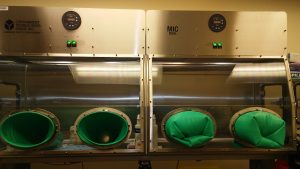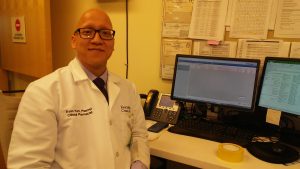Continue reading Radon Gas, The Invisible Cause of Lung Cancer
Continue reading Radon Gas, The Invisible Cause of Lung Cancer

Before I concluded my chemotherapy, I sat down with the pharmacist who had mixed my drugs for nearly three years and recorded our conversation for my erstwhile podcast, The Deep Breath. It offered a revealing look inside the process of administering chemo, as well as other drugs used to treat cancer patients.

I did not realize that I was one of the longest consistent patients currently receiving treatment at this facility. Although I was preparing to call chemo quits after slightly more than 2.5 years, I knew of at least one patient who had been on the same basic regimen as me for around seven years. But that had been before my time. As I settled in to interview my pharmacist, he revealed that he was not aware of any patient at the clinic who had been receiving chemotherapy as long as I had been since he started the job. I appreciated the special distinction, even though I had mixed feelings about it. Continue reading Inside a Chemo Clinic Phamacy
I knew that I would not stay on chemotherapy forever. So getting to the point where I ended my “chemo journey” was not completely surprising. In fact, I had anticipated that a change would be good for some time — after over 2 1/2 years of the same routine, not only had it begun to gnaw at me each time I faced another infusion and ensuing side effects, but there was something of a “gut feeling” that the chemotherapy drug I had been on for so long had done about all it could do. I was probably influenced a lot by the promise of Immunotherapy drugs that had become the media darlings of the cancer world. When my oncologist said it was a good time to consider another approach, I was eager to do it.
Besides immunotherapy, for which I had hoped to join a clinical trial, there was the possibility that I might harbor an actionable gene mutation for my adenocarcinoma. My initial genetic analysis from a biopsy prior to starting chemo had shown none of the mutations that were being directly treated at that time. But a couple of years makes a big difference in the cancer world, especially with the increasing rate of progress science has been making over the past few decades. A re-analysis of that old biopsy showed nothing new, but a quick, painless liquid biopsy — two simple tubes of blood and fifteen minutes of my time — revealed that I harbor a fairly rare mutation, one that affects roughly two percent of the adenocarcinoma subset of lung cancer patients: ErbB2, also known as HER2.
This shifted gears for me regarding the drive down my treatment path. It also made me shift perspective. There is the question, now, of whether finding myself in such a cancer minority is a sign of good fortune. On one hand, it means that my genetic demographic is not highly studied — the downside to minority group patients is simply that there are fewer of us to put into clinical trials. Flip that over, however, and it makes the trials that have been done highly specific — and it makes the case studies on patients with this mutation also highly specific. Which in turn suggests that this might be a very positive development after all. Continue reading Frying Pan, Meet Fire – Leaping from One Therapy to Another
My treatment is far from done, my “cancer journey” only partly traveled, but I am saying goodbye to chemotherapy — at least for now. Forty rounds of infusions came to an end last week and, though my brain is fatigued and my body is a bit of a mess, I’m taking a moment to appreciate the things I definitely will not be missing.
Topping my list, even above the malaise and nausea that sometimes follows my treatment, is:
It’s been a nasty thorn in my side, that gag reflex. Just brushing my teeth will set it off, causing me to wretch over the sink, even if it has been a long time since I ate. And scents of any kind have been known to cause gagging, too — and not just the smell of rot or the cat box or whatever was thrown in the garbage can the night before, but, yeah, all of those, too. Goodbye, gag reflex!
The days following my infusion are better with frequent showers. As I purge toxins, I always imagine that I smell horrible — and, in fact, I often cannot stand my own odor. But beyond that, my skin just feels gross. I’ve had the weirdest blemishes, well beyond any teenage acne I experienced in my wayward youth, and it wasn’t always easy finding soaps that I could tolerate in the enclosed space of a shower. Waking with a slick layer of grease on my face and a sticky sensation all over my body (worse on hot days, of course), mixing thick perspiration and whatever else is pushing through my pores, is an experience I am more than ready to be done with. Continue reading Side-Effects I Won’t Miss: The Chemo Diaries, a Coda
As long-time readers know, I take issue with a number of high-profile “wellness warriors” and anti-science advocates who claim to offer “natural,” “holistic,” or simply “alternative” treatments that can cure cancer or prevent it entirely. Chief among these are Chris Wark and Ty Bollinger, two people with absolutely no scientific or medical training and tons of bad advice. They are part of a large network of disreputable and largely discredited hucksters, many of whom get by on their claims by offering just the tiniest shred of truth mixed in with their hyperbole and insidious messages. They thrive in our increasingly anti-intellectual culture, where headlines and sound bytes sway their customers and their “fan base” into believing that there is substance to their messages. This is why, more than ever, it is essential to take a critical approach to all the medical headlines that are presented, and especially those making extraordinary claims.
The well-established and professionally vetted website, Healthline, has a very good primer on the subject of spotting fake medical news. It could hardly be more topical. There is nary a day that goes by when some website or other isn’t making absurd claims about the latest health craze or danger. Whether it is bloating the risks of GMO foods or misrepresenting the cancer risk from eating red or processed meat, there are more sources out there in the ether intent upon cherry picking data or simply removing it from context in order to sell their point than there are serious outlets for the reporting of science news. Part of the problem with this is that science news isn’t usually considered very sexy or commercial, but a bigger problem is that it is generally difficult for most people to fully understand.
And capitalizing on that, we have opportunists like Chris Wark, a self-proclaimed guru on defeating cancer without chemotherapy. Duly note, of course, that Mr. Wark was cured through surgical intervention and, while chemotherapy was recommended as an adjunctive treatment to lower the risk of future metastasis, there was no indication that he had any actual, existing metastases that needed treatment. To put it bluntly, he was one of the lucky colon cancer patients who had it all taken out without any recurrence. This had nothing to do with whether or not he received chemotherapy, and there is no way of knowing how he would have responded to such treatment or whether his “lifestyle” choices have had any bearing whatsoever on his post-surgical health. Continue reading Common Sense, Clarity and Wellness Warrior Lies